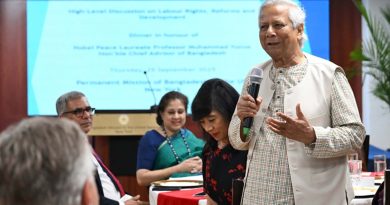Bangladesh stands to benefit significantly from the shifting dynamics of global trade, particularly in the apparel sector, as tariff tensions reshape sourcing strategies worldwide, according to Bangladesh Garment Manufacturers and Exporters Association (BGMEA) President Mahmud Hasan Khan.
In an exclusive interview with UNB, Khan said the United States’ recent imposition of a 20 per cent tariff on Bangladeshi apparel products—lower than the 25 per cent and 30 per cent levies on Indian and Chinese goods respectively—places Bangladesh in a competitive position to attract international buyers.
“This is a pivotal moment for Bangladesh,” Khan said. “While global trade wars are causing uncertainty, they also open up new avenues for Bangladesh’s garment exports. But to seize this opportunity, we must address our infrastructure and logistics challenges without delay.”
Tariff Advantage Creates Market Opportunity
Khan emphasised that the current geopolitical climate could shift a considerable portion of apparel orders from China and India to Bangladesh. “The tariff differential gives us a clear edge, but buyers will expect timely delivery. That’s where our logistics must step up,” he said.
He also noted that Bangladesh can further reduce effective US tariffs by incorporating US-origin content—such as cotton—into its garments. “If our exports use 20 per cent or more US inputs, the applicable duty can be reduced from 20 to 16 per cent, and possibly lower with higher content,” he explained.
Infrastructure, Energy, and Customs Key to Sustained Growth
Despite favourable trade conditions, Khan underscored that Bangladesh’s growth will hinge on foundational improvements.
“Our ports must operate at global standards. The Chattogram port’s capacity and customs procedures need immediate upgrades,” he said. “Uninterrupted gas and electricity supply is no longer optional—it’s essential.”
He added that smoother transport, especially along the Dhaka–Chattogram highway, remains critical for maintaining shipment schedules and export reliability.
Port Management Reform Under Review
On the proposal to involve foreign firms in port operations, Khan said experienced international operators could improve efficiency but warned that cost must remain competitive.
“Professional expertise is welcome, but if fees are too high, it could undermine our export pricing advantage,” he noted.
BGMEA Reform and Digitalisation Underway
Khan also highlighted several reforms within the BGMEA, including full digitisation of services for its members and transparent internal governance.
“Our recent election saw over 90 per cent member turnout, which is a testament to the democratic transformation we’ve initiated,” he said.
He acknowledged that while many reforms are in motion—such as reducing subscription fees, launching a worker welfare fund, and amending labour laws—these initiatives will require continuity beyond a single leadership term.
Addressing Misuse of Bonded Warehouses
Responding to concerns about bonded warehouse misuse, Khan said the BGMEA is prepared to support enforcement efforts, provided the National Board of Revenue (NBR) offers specific allegations.
“So far, no formal complaints have been lodged against our members. We’re fully prepared to take action, but enforcement must be evidence-based,” he stated.
Safeguarding Exporters from Defaulting Buyers
To protect garment manufacturers from non-paying buyers, Khan announced the BGMEA’s plan to maintain a blacklist and alert members.
“If buyers delay payments or reject shipments without cause, we will intervene—either directly or through diplomatic channels,” Khan said. “This is part of our commitment to safeguarding our members’ interests.”
Looking Ahead
Khan concluded by reiterating that Bangladesh is well-placed to emerge stronger in the evolving global trade order—but only if structural reforms keep pace with external opportunities.
“We’ve started this journey of transformation within the BGMEA and the industry. Our future success depends on how swiftly we can execute these changes,” he said.
Bangladesh, already the world’s second-largest garment exporter, now finds itself at a crossroads—armed with opportunity, but challenged by the need for rapid reform.






